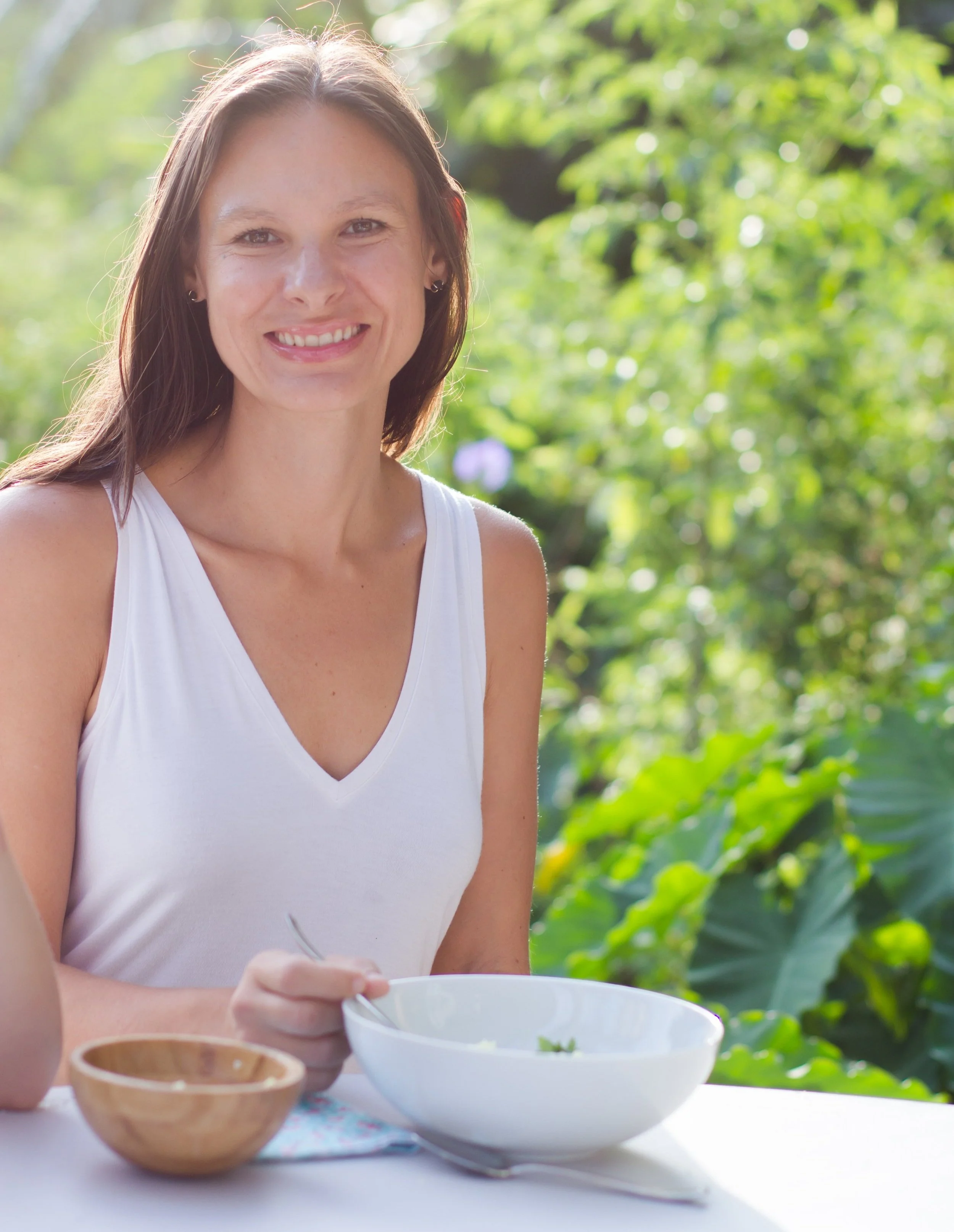ANGELA PERGER
“So much of Ayurveda aligns with the wisdom of our grandmothers, regardless of our heritage.”
Angela Perger is a nature-loving mama of two beach babies, an Ayurveda practitioner and a holistic health professor. She holds a Master of Science in Education and is the founder of The Simple Ayurveda School where she facilitates an intimate Ayurveda health counsellor training program.
The Simple Ayurveda Podcast is a top 100 podcast where Angela shares the good, the bad, the joyful and even the most embarrassing parts of living an Ayurvedic lifestyle.
Follow Angela:
Website: Simple Ayurveda
Instagram: @simple_ayurveda
“Ayurveda influences all parts of my life; from everyday choices like when and what to eat, prioritizing sleep and scheduling Yoga Nidra every afternoon during the vata hours… to bigger decisions like travel and career.”
What does Ayurveda mean to you?
Ayurveda is a beautiful and sacred system for living in alignment with nature, universal truth and my highest Self.
When did you discover it? How long have you been practising it?
A few years after falling in love with yoga I signed up for a yoga teacher training because I wanted to deepen my understanding and perhaps teach yoga to the students I worked with in Philadelphia. I slowly started incorporating Ayurveda into my life in 2011 before going “all in” in 2017.
What drew you to Ayurveda?
Yoga changed my life in so many incredible ways that I knew Ayurveda was next. However the complete commitment came along after the birth of my second child when I experienced compounded health issues. I had already been studying and practicing holistic health since 2003 and my path finally led to Ayurveda.
Has it helped you with anything major?
Pregnancy brought on hypothyroidism. This was the push that led me to formally study Ayurveda and I was able to heal it naturally.
But more importantly, Ayurveda helped me to make peace with my body. At age 21 I was diagnosed with ulcerative colitis and a rare liver autoimmune disorder. Over the years I tried many healing protocols, many of which led me around in circles.
Ayurveda taught me how to slow down and listen to the signals from my body, how to eat based on my digestion, how to manage symptoms before they spiral, and how to preserve my energy. Ayurveda has also taught me about emotional digestion and mental health, especially in relation to living with these health conditions.
I may never be fully “cured” but I have learned how to take care of myself in a way I never imagined possible.
Is Ayurveda part of your everyday life or just for your medicine cabinet or fall-back routine?
Ayurveda influences all parts of my life; from everyday choices like when and what to eat, prioritizing sleep and scheduling Yoga Nidra every afternoon during the vata hours… to bigger decisions like travel and career. I’m always considering agni, ojas and the doshas before taking action.
What are your top 3 Ayurvedic tips that have worked for you?
Create stability with a daily rhythm by designating windows of time for meals, waking and sleep.
Understand the essence of the teaching without being rigid, as the point is not to create more stress in your life but to cultivate ease and clarity.
Stop scrolling first thing in the morning or during meals. It makes such a difference energetically!
What surprised you most about Ayurveda?
So much of Ayurveda aligns with the wisdom of our grandmothers, regardless of our heritage.
Also, that there is a lot of wiggle room within the recommendations to make Ayurveda your own.
Did you integrate it gradually or overnight for any particular reason?
It was a slow integration for a few years and then a big leap into formal studies. Once I felt the magic of a true Ayurvedic lifestyle I never looked back!
Do your children/family eat an Ayurvedic diet? And if they do, do they know it’s Ayurveda or do they just think of it as home cooking?
My family follows the path of moderation. For example, we’ll have an Ayurveda-inspired Mexican bowl with basmati rice and black beans, cooked with the digestive spice cumin. I’ll sauté purple cabbage in ghee and sprinkle it with cilantro for a “slaw” while mashing up avocados for a simple variation of guacamole. The kids might have tortilla chips or a cheese quesadilla with their bowls. My husband might top his with sour cream or salsa. We all have the same base, but they have freedom too.
My children do know about Ayurveda as it’s something that’s not a part of our cultural heritage and it’s different from how their friends eat. I try to keep the explanations simple and lighthearted. They also love learning about the specific topics I’m teaching or hearing stories about the podcast.
What is your favourite Ayurvedic recipe or go-to ingredient?
Ghee!
What do you wish was easier in our society to make an Ayurvedic lifestyle more accessible?
Simplicity! Ayurveda really supports us to slow down and enjoy the little things in life. It’s up to us to create boundaries and resist over scheduling.
Do people around you/in your circle of friends know about Ayurveda?
I felt alone in it for many years, but now I am surrounded by friends that either love Ayurveda or are curious about it.
What’s the one thing you would encourage everyone to try or you think would benefit the majority of people’s health for the better?
Both Ayurveda and Western science promote sleep as an essential part of good health. I can’t say enough good things about prioritizing sleep.
Anything else you’d like to add?
When your life is aligned with nature and an understanding of your prakriti and dharma, you have the opportunity to experience true freedom.

